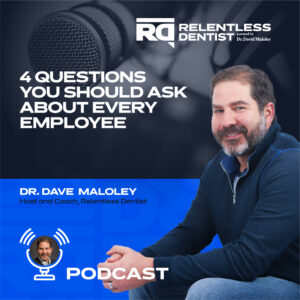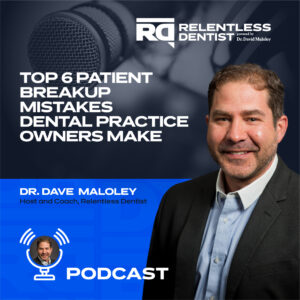by [email protected] | Feb 9, 2022 | Prescriptions for your Practice
Podcast: Play in new window | Download
 Fact: In today’s polarized and litigious society, it’s easier to complain than find good employees. Crafting a reliable team to work with is almost next to impossible. But there’s still hope.
Fact: In today’s polarized and litigious society, it’s easier to complain than find good employees. Crafting a reliable team to work with is almost next to impossible. But there’s still hope.
How do you build a practice with a culture that gives patients an experience in a high trust environment? That gives employees a workplace that provides them both money and meaning? And that ensures the vitality of your business? If you’re asking yourself these questions, you have to listen in.
This week’s podcast topic is about enhancing culture — I’ll be discussing four questions you should ask yourself about every single employee. I’ll cover the most valuable skill a dental practice owner can develop far more valuable than any procedure you can learn or add to your procedure mix. So, if you want a framework that unleashes the genius of your team, a way to diagnose the dysfunctions in your culture, and a method to avoid all that counterproductive advice that inhibits team immunity and holds your practice back, then stay tuned.
Tune in and find solutions to common practice issues at Prescriptions for Your Practice.
Key Quotes:
- “I’m proposing is that we become great at diagnosing the true problem and master the art of building and aligning a team.”
- “Team building is the most valuable skill to acquire in our profession right now.”
- “One of the keys to strong leadership is you teach people how to think. You teach them how you would make decisions, and therefore they can make decisions.”
- “If we start to engage these things, you’ll see people get a little bit better and a little bit more confident, a little bit more decisive, a little bit more service-oriented, and surprise and delight patients a little bit more.”
- “And a lot of people say, I can’t get my team to think like an owner, and that’s a partial truth. They’ll never be as invested as you are.”
Featured on the Show:


by [email protected] | Dec 8, 2021 | Legendary Leadership, Prescriptions for your Practice
Podcast: Play in new window | Download
 A leader is a dealer in hope. — Napoleon Bonaparte
A leader is a dealer in hope. — Napoleon Bonaparte
What type of leader are you? Do you inspire your staff, or do you always throw your weight around? Is your leadership style leans toward passiveness, aggressiveness, or assertiveness? Do you treat your team with respect to demand the same?
In this episode, I’ll talk about assertive communication and how not being assertive at work results in overstepping boundaries, lots of frustration, misunderstanding, and hurt feelings. I will also share the seven keys to becoming more assertive in your practice. If you want to elevate your leadership game a notch, then this podcast is for you.
Tune in and find solutions to common practice issues at Prescriptions for Your Practice.
Key Quotes:
- “Assertiveness is communicating and expressing your thoughts, feelings, and opinions in a way that your views can be clearly understood by others without putting down their thoughts, their feelings, and their opinions.”
- “If we tend to be a little bit more passive, assertiveness feels like aggression until it becomes a habit.“
- “The cool thing about assertive communication is that it has the power to magnify all your other leadership strengths.”
- “The reality of our communication as leaders, as practice owners, is that they’re always two messages being conveyed simultaneously. One is the content of the communication, and the other piece is the manner in which it’s conveyed.”
Featured on the Show:
- Quote: “The single biggest problem in communication is the illusion that it has taken place.” — George Bernard Shaw
- I appreciate your feedback. Let me know what you learned and loved here: [email protected].


by [email protected] | Nov 17, 2021 | Prescriptions for your Practice
Podcast: Play in new window | Download
 Before you tap that play button, I want you to ponder these questions first: What do patients consider when they choose their dentist? And what makes them go and explore dental services from other dentists?
Before you tap that play button, I want you to ponder these questions first: What do patients consider when they choose their dentist? And what makes them go and explore dental services from other dentists?
In medicine, research shows that 30% of patients leave the doctor’s office because of long wait times. Unfortunately, the number is higher when it comes to dental offices. The long wait times can make a patient believe that you’re in a poorly run business. And if it’s a poorly run business, you have subpar clinical standards.
In today’s episode, I will discuss the six top reasons why patients break up with dentists. Then, we will talk about patients’ perception of us and how we can maintain that in a positive frame, and how we can prevent the consequences of patient attrition. I’ll also share lessons from medical doctors’ mistakes so that you can prevent patients from even wondering if the grass is greener somewhere else. So just sit back, relax and enjoy the show.
Tune in and find solutions to common practice issues at Prescriptions for Your Practice.
Key Quotes:
- “As smart business owners, we have to manage the upside push for growth and minimize the downside. And what’s the downside when it comes to enthusing clients? I think that’s when patients leave the practice, when they break up with us, and when there’s patient attrition.”
- “Oftentimes, we’re able to maintain the relationship with the patient once they feel understood. And even if we weren’t, we can learn things that will help our processes, our systems. So as we strove to get better and better, we looked for more gems in those situations.”
- “Now urgent care is a big patient perception because what is no big deal to you might be a really big deal to patients.”
- “Patients aren’t loyal. If they’re feeling, feeling mistreated or ignored, or that you’re always running behind, they might find those greener pastures.”
- “If patients feel like they’re just a number on a spreadsheet that you’re pushing treatment on them, that you have aggressive sales tactics, that you don’t have their best interests at heart, that then they’re going to feel inclined to be a patient somewhere else.”
Featured on the Show:
- Quote: “Customers perceive service in their own unique, idiosyncratic, emotional, irrational, end-of-the-day, and totally human terms. Perception is all there is!” — Tom Peters
- I appreciate your feedback. Let me know what you learned and loved here: [email protected].


by [email protected] | Oct 20, 2021 | Prescriptions for your Practice
Podcast: Play in new window | Download
 What are we doing to ensure that we’re not presenting treatment in a skeptical environment and inadvertently generating negative marketing for ourselves and our businesses?
What are we doing to ensure that we’re not presenting treatment in a skeptical environment and inadvertently generating negative marketing for ourselves and our businesses?
Research shows that 55% of all communication is in the body language, 38% is in the tone of voice, and 7% is in the actual words spoken — all of which make up the overall impression we give out to our patients.
The way your patients perceive your practice impacts every decision and action they take. This perception has a rippling effect on your confidence, staff, potential customers, and business security.
In today’s episode, I’ll share with you two contrasting personal stories on what enthusing client is and what it’s not. Then, I have some tips that you can train your team on to ensure you’re generating high-trust case acceptance in your practice. I’ll also talk about the importance of picking up non-verbal and social cues to reciprocate appropriate responses.
Tune in and find solutions to common practice issues at Prescriptions for Your Practice.
Key Quotes:
- “If we don’t do our practice in a trusting environment, it can generate buyer’s remorse and resentment if something goes wrong.”
- “Too often, we hang too much on what our patients are telling us, and sometimes they are not candid.”
- “We have to make sure that we’re picking up on the tone of voice and body language before we’re really satisfied that this person is scheduled for the next phase of treatment.”
- “If we don’t read their body language, we can inadvertently scare and confuse the patient.”
- “The possibility is that we appreciate that body language doesn’t lie.”
- “The goal that we must establish and the intent that we should have is that every patient all day long is seen, heard, and felt like we’ve let them know that they matter to us.”
- “You should look for a long-term relationship because it pays dividends again and again and again.”
- “Your team is your eyes, ears, and spokespeople, so they must be good as you are, if not better.”
Featured on the Show:


by [email protected] | Aug 11, 2021 | Prescriptions for your Practice
Podcast: Play in new window | Download

What does it mean to create a team of leaders?
We all know that great leaders don’t create more followers but inspire followers to become leaders. As practice owners, we aspire to have a self-managing team to achieve this goal. Unfortunately, however, it is pretty standard in the dental practice that staff functions based solely on the dentist’s command. Therefore, it defaults to an extra layer of policy and bureaucracy, creating a toxic environment for the staff, the owner, and even the patients.
In this episode, I will talk about autonomy. A unit that’s heavily reliant on command and compliance is a recipe for distrust and disengagement, and it’s essential to address this issue head-on to establish autonomy among members. Also, I will share with you the six tenets that will help your team manage themselves better. Because in a self-sufficient environment, individuals function autonomously, and their accomplishments contribute to the team’s overall growth and success.
Tune in and find solutions to common practice issues at Prescriptions for Your Practice.
Key Quotes:
- “We typically believe that a self-managing team is either a fantasy or we believe that we need a team of all-stars to pull it off.”
- “We can train good help by leading everyone to break old patterns, old unproductive behaviors that they learned and turn them into highly productive autonomous habits.”
- “My practice is not limited by its opportunities but it’s limited by its leader.”
- “Leaders don’t create followers. Leaders create leaders.”
- “You need to set the expectation that you’re gonna give all the tools and training that they need to succeed in their job.”
- “Everyone has to leave their ego at the door.”
- “Be open. Train the team to be receptive to new ideas and to seek out ways to do their job better.”
- “Make sure that growth is the expectation by helping them to find their next mastery level in their job.”
- “Ensure that every team member is better after they work for you.”
Featured on the Show:


 Fact: In today’s polarized and litigious society, it’s easier to complain than find good employees. Crafting a reliable team to work with is almost next to impossible. But there’s still hope.
Fact: In today’s polarized and litigious society, it’s easier to complain than find good employees. Crafting a reliable team to work with is almost next to impossible. But there’s still hope.


 A leader is a dealer in hope. — Napoleon Bonaparte
A leader is a dealer in hope. — Napoleon Bonaparte Before you tap that play button, I want you to ponder these questions first: What do patients consider when they choose their dentist? And what makes them go and explore dental services from other dentists?
Before you tap that play button, I want you to ponder these questions first: What do patients consider when they choose their dentist? And what makes them go and explore dental services from other dentists? What are we doing to ensure that we’re not presenting treatment in a skeptical environment and inadvertently generating negative marketing for ourselves and our businesses?
What are we doing to ensure that we’re not presenting treatment in a skeptical environment and inadvertently generating negative marketing for ourselves and our businesses?